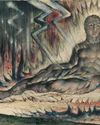يحاول ذهب - حر
A Philosophical Autobiography
April/May 2021
|Philosophy Now
Robin Wynyard reflects on his philosophical journey, and how this has influenced his thoughts about ageing.

Youth always has its share of idealism, whereas old age encourages reflection and more than a little guilt for past misdemeanours. Being seventy-four, and a member of a designated vulnerable group during the current Covid-19 pandemic, can be more than a little confusing, given mixed messages from the media. Should I stay at home and self-isolate? And if so, how should I pass my time?
I began by revisiting my profile on LinkedIn, an online platform for professional networking. I had joined LinkedIn around nine years earlier, when coming to the end of my academic career, whereupon I had posted formally, with the aim of promoting my brilliance, fantasizing that no one in the world of education could do without my special skills. Attempting now to update my profile, I was hit by the stark realization of how much my perception of life had changed over the years.
I then rewatched a film that as a sixteen-year old I was much taken with – Ingmar Bergman’s 1957 masterpiece The Seventh Seal, which is not, as you might think, a nature film but is inspired by the Book of Revelation. The film features death, plague, and famine amongst the horsemen of the Apocalypse, and those scenes, shot in black and white, have fascinated me for years. The stakes of the game of chess played throughout the film between Death and the knight are not merely the crusader’s life and soul, but his feelings about God and his general disillusionment with religion and humanity. However, given the Covid situation, the film’s plague setting seemed all-too-familiar, and upon re-watching it, far from being overwhelmed by its brilliance as I was in my youth, it terrified me!
هذه القصة من طبعة April/May 2021 من Philosophy Now.
اشترك في Magzter GOLD للوصول إلى آلاف القصص المتميزة المنسقة، وأكثر من 9000 مجلة وصحيفة.
هل أنت مشترك بالفعل؟ تسجيل الدخول
المزيد من القصص من Philosophy Now

Philosophy Now
Bilbo Theorizes About Wellbeing
Eric Comerford overhears Bilbo and Gandalf discussing happiness.
9 mins
December 2025 / January 2026

Philosophy Now
What Women?
Marcia Yudkin remembers almost choking at Cornell
11 mins
December 2025 / January 2026

Philosophy Now
Islamic Philosophers On Tyranny
Amir Ali Maleki looks at tyranny from an Islamic perspective.
4 mins
December 2025 / January 2026

Philosophy Now
Peter Singer
The controversial Australian philosopher defends the right to choose to die on utilitarian grounds
5 mins
December 2025 / January 2026

Philosophy Now
Another Conversation with Martin Heidegger?
Raymond Tallis talks about communication problems.
7 mins
December 2025 / January 2026

Philosophy Now
Letters
When inspiration strikes, don't bottle it up. Email me at rick.lewis@philosophynow.org Keep them short and keep them coming!
17 mins
December 2025 / January 2026

Philosophy Now
The Philosophy of William Blake
Mark Vernon looks at the imaginative thinking of an imaginative artist.
9 mins
December 2025 / January 2026

Philosophy Now
Philosophical Haiku
Peering through life’s lens God in nature is deduced: The joy of being.
1 mins
December 2025 / January 2026

Philosophy Now
Philosophy Shorts
More songs about Buildings and Food' was the title of a 1978 album by the rock band Talking Heads. It was about all the things rock stars normally don't sing about. Pop songs are usually about variations on the theme of love; tracks like Rose Royce's 1976 hit 'Car Wash' are the exception. Philosophers, likewise, tend to have a narrow focus on epistemology, metaphysics and trifles like the meaning of life. But occasionally great minds stray from their turf and write about other matters, for example buildings (Martin Heidegger), food (Hobbes), tomato juice (Robert Nozick), and the weather (Lucretius and Aristotle). This series of Shorts is about these unfamiliar themes; about the things philosophers also write about.
2 mins
December 2025 / January 2026

Philosophy Now
Hedonic Treadmills in the Vale of Tears
Michael Gracey looks at how philosophers have pursued happiness.
8 mins
December 2025 / January 2026
Translate
Change font size
